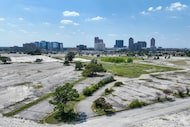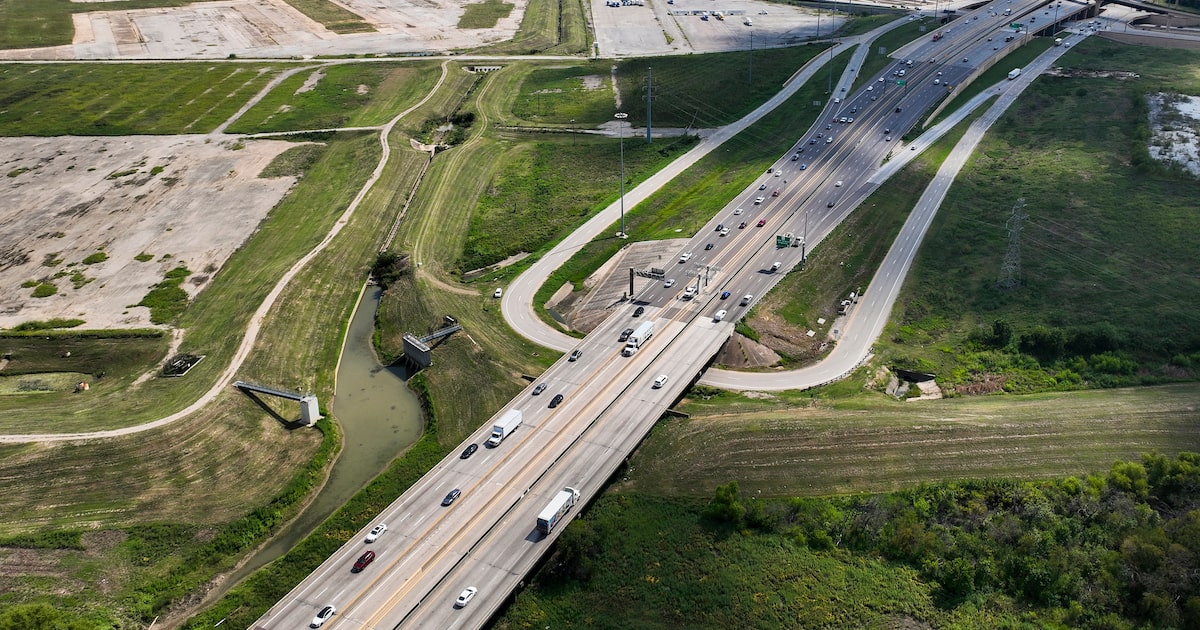Editor’s note: This story is part of a special report, “State of Play,” which examines the suitability of key North Texas locations most likely to be considered as a potential home for a new Dallas Mavericks arena complex.
Dallas-Fort Worth has its share of famous spots for hosting big games — but the former Texas Stadium in Irving is arguably among its most well-known.
Opened in 1971, it housed the Dallas Cowboys amid their rise to prominence as “America’s Team.” Even the partially closed roof became part of its lore after one player, when asked about the ceiling structure, said it was “so God can watch his favorite team.”
The Cowboys left that stadium more than 15 years ago, and the Irving icon would later be destroyed.
D-FW Real Estate News
But recently, there has been fresh speculation that the storied area — more specifically an area that included parking next to the former structure — could see a new chapter with another pro team: the Dallas Mavericks, who have signaled they’re open to a new home.
The team could be on the move with the expiration of its lease in 2031 at American Airlines Center in Victory Park.
Related
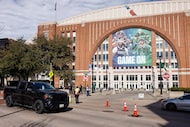
Texas Stadium is among the more talked-about alternatives for a site, though it could face challenges as a site outside of Dallas.
“I think it’s an incredible location,” said Kyle Taylor, former City Council member and a former visitor to the parking lot and stadium.
Mavericks CEO Rick Welts told The Dallas Morning News the Mavericks are looking for a 30- to 50-acre site in Dallas, but he stressed in July that the team is nowhere close to making a decision.
Dallas recently hired Hillwood Urban Services, a commercial real estate firm founded by Ross Perot Jr., to scout potential locations for a new Mavericks arena in the city.
Hillwood did not respond to inquiries regarding potential landing spots for the Mavericks it was assessing, but Dallas stakeholders are overwhelmingly in favor of the stadium remaining inside city limits.
That paints Irving as a possible wild card — and potentially a bargaining chip for the Mavericks to use in negotiations.
But if a Dallas deal fails to materialize, the inner city suburb could make sense.
After 38 years, Texas Stadium, home of the Dallas Cowboys, was imploded on Sunday, April 11, 2010, in Irving.
Tom Fox / Staff Photographer
‘World-class everything’
The property at the center of the speculation is owned by entities tied to Las Vegas Sands Corp., the resort and casino firm owned by the Adelson family ― which together with the Dumont family purchased the Mavericks in 2023.
Companies affiliated with Las Vegas Sands own roughly 200 acres near the old Texas Stadium site, and the company’s chief operating officer is Mavericks Governor Patrick Dumont.
The Irving locale offers a relatively close spot to its bigger neighbor with a massive swath of land that could include many other amenities, including restaurants and retail.
“You could do world-class everything over there because there’s so much space,” said Brad LaMorgese, another former City Council member.
“And I think it would be fitting for the Dallas Mavericks to stay in Dallas County, if they … didn’t work out something with Dallas.”
Still, the Mavericks organization is putting efforts into the city where it resides now.
“As we have said, we are focused on working with the City of Dallas to identify a site for a new Mavericks arena and entertainment district,” Welts said in an emailed statement.
“We are doing deep dives on potential Dallas sites now with the hope of selecting a site by the end of the first quarter of 2026.”
And as for Sands, it hasn’t made any statements as it relates to future plans for the site, said Ron Reese, spokesperson.
High-intensity mixed-use
Irving came under more interest earlier this year, when its City Council voted to initiate a rezoning application that would create a high-intensity mixed-use area. In part, it would be earmarked for “an arena with a minimum of 15,000 seats and/or an indoor theater with a minimum of 4,000 seats.”
It also permitted uses within the tract that would include a destination resort with one or more luxury hotels, spas, pools and “may include Casino Gaming if authorized by the Constitution and laws of the state of Texas.”
That casino element stirred controversy and incited critics. At a planning and zoning meeting in March, the event went on for hours.
Ashton Ellis, vice president of development and university relations for the University of Dallas, said the private Catholic university opposed the rezoning amendments.
Ellis cited concerns about gambling, the project’s size and its effect on motorists and foot traffic — issues he said had not been adequately studied. Others spoke in support of the zoning change, pointing to potential economic benefits.
The zoning changes managed to pass by one vote. However, later in the week the City Council would approve the amended zoning proposals with no gambling portion for Las Vegas Sands.
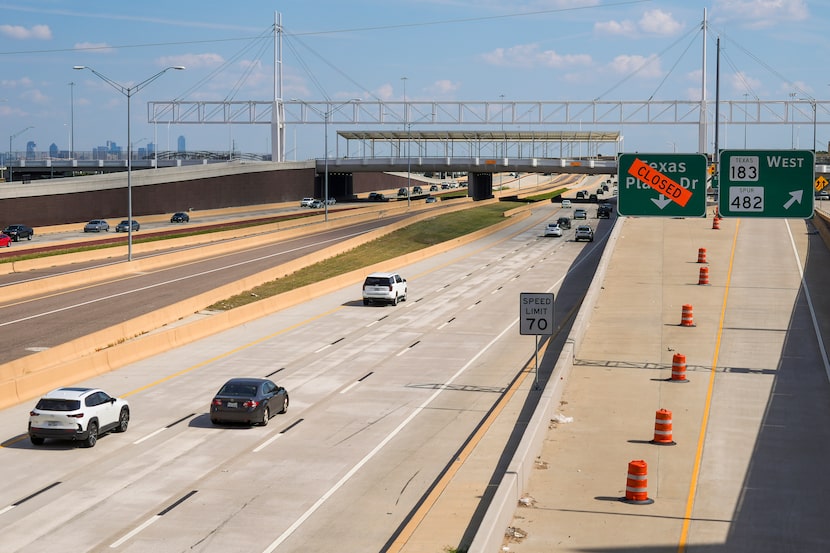
The Irving Signature Bridge crossing State Highway 114 is seen near the former Texas Stadium site on Friday, Sept. 12, 2025, in Irving.
Smiley N. Pool / Staff Photographer
A good location?
The roughly 200-acre property of interest sits at the intersection of Loop 12 and State Highway 114, northeast of the former Texas Stadium piece, which is nearly 80 acres. Most of the land is owned by Village Walk RE 2, which is affiliated with Sands, according to Dallas County records.
Some see the site as a good alternative to the location at American Airlines Center — and other alternatives deep in the core of the city — as it provides a wide open area with access for folks from all over North Texas.
The Irving locale is a short distance away from both DFW International Airport and Dallas Love Field, and it’s accessible — bordered by highways on three sides and the Trinity River, which shields it from nearby developments. A new DART station is planned nearby.
SH 114 and Loop 12 give it a couple of points of connection with the massive Interstate 35E and other major thoroughfares. There’s good access for residents in Collin and Denton counties, according to Taylor, the ex-City Council member.
“You’ve got major thoroughfares, arteries, freeways,” said Geoffrey Propheter, associate professor at the University of Colorado Denver. “It’s not nearly as much of a problem than … you know, plopping … these more downtown locations.”
It’s more common for NBA teams to land in the urban cores of their cities — though not always, Propheter said, noting that the Irving site has seen growth since the Cowboys exited.
For example, the former arenas for the Cleveland Cavaliers and the Sacramento Kings were not in the heart of their respective cities. That can mitigate congestion and noise along with crime of the petty sort that is more likely when lots of people gather, Propheter said.
Parking space
Parking could be managed as well, Taylor said. Given the size of the land — and that it could be built from the ground up, an area with multiple floors could handle basketball events.
It’s a “waste of real estate” to use big, flat ground parking lots, he said. Instead, it’s better to aim for structures that are underground — or are taller — to accommodate vehicle spaces.
And fans of pro basketball wouldn’t have to use vehicles to travel to the site, with it already set up to accommodate public transportation. It sits next to tracks for a DART line, and also is near the University of Dallas stop.
A mass transit access point ”would bring people right into this stadium,” LaMorgese said. “I think several lines could just about get there.”
And there’s plenty of room for a lot more to keep people coming when there isn’t an NBA game on the schedule, Taylor said, noting it could be used “12 months out of the year” with the right project development in partnership with the city.
Still, with a development, a levee at the site would need to be addressed to provide more usable space. “It’s very doable, but it is an undertaking,” LaMorgese said.
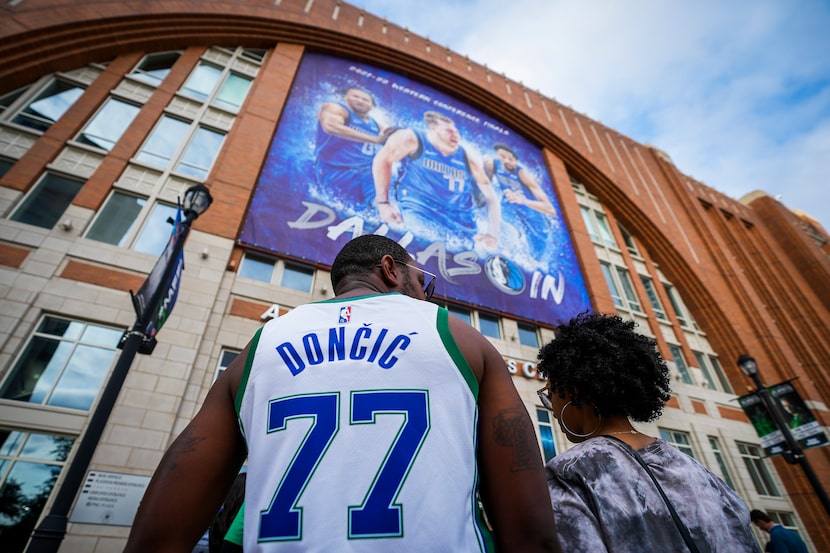
Dallas Mavericks fans wait to enter the arena before Game 3 of the NBA Western Conference Finals against the Golden State Warriors on Sunday, May 22, 2022, in Dallas.
Smiley N. Pool / Staff Photographer
The casino option?
With or without the Mavericks relocating, could the site’s eventual tenant include a casino?
Whatever might happen, that could take a while ― perhaps several years, Taylor said. For one, the Texas Legislature would have to approve it, something that hasn’t worked in the past, even as Sands has said it’s pushing ahead. Other additional steps could make it a multiyear project.
Sands has expressed patience with the process. “We’re happy with the progress we made this session,” Andy Abboud, a senior vice president at Sands, said in a statement in May.
“We have always said this will be a marathon, and we still strongly believe that destination resorts coming to Texas is inevitable, which is why we’re not going anywhere.”
Taylor noted there are other steps after any legislative approval. But he has seen public opinion change over time after years of experience on the City Council — and he sees potential in the revenue a casino could generate. Still, he noted there are challenges with communities approving such a move.
It’s not clear what might happen and could sell the property. Whatever the case, the site’s historical place will likely mean it continues to get a lot of attention whenever the idea of a stadium bubbles up locally.
“It‘s sort of one of Irving’s remaining crown jewels,” LaMorgese said.
Related
